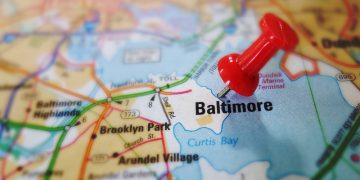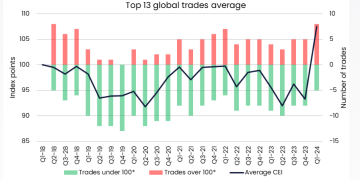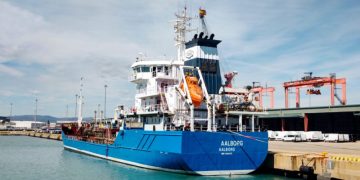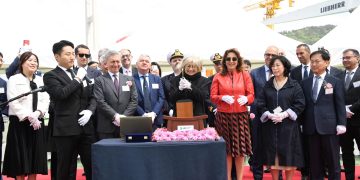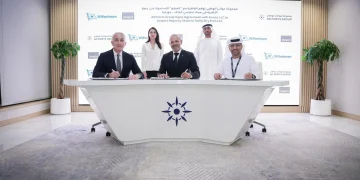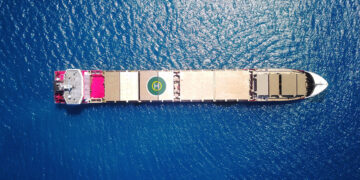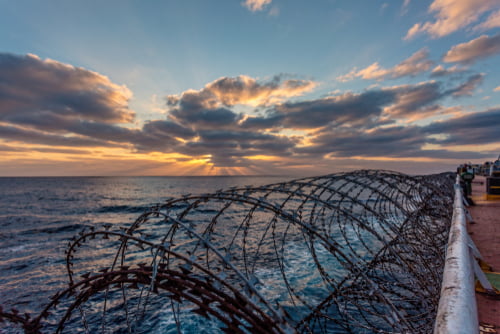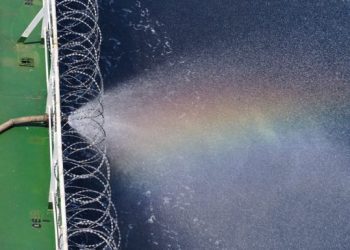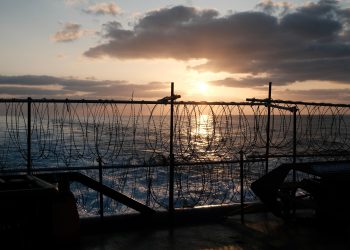In an exclusive interview, Lieutenant Colonel Lester Yong, Head Information Fusion Centre, refers to today’s maritime security situation and presents the top items on IFC’s agenda to make shipping safer.
Furthermore, LTC Yong explains how has COVID-19 affected maritime security globally, presenting new trends and provides lessons learned from the past.
SAFETY4SEA: What are the top priorities in IFC agenda?
L.Y: Over the years, the IFC has established itself as the maritime security (MARSEC) info-sharing hub in this region to collate and sense make commercial shipping information so that we can pass timely and actionable information to our partners and cue operational responses. This remains IFC’s top priority. To ensure we can do our job better, the IFC is looking to expand our partner base beyond the navies, to include coastguards and other maritime enforcement agencies to increase sources of information and improve our sense making capabilities.
Over the years, it has also become very clear to the IFC that the shipping community is an invaluable source of information and partner to enhance overall MARSEC enforcement efforts. As such, the IFC intends to increase efforts to strengthen collaboration with the shipping industry through various activities such as our Shared Awareness Meetings, company visits/workshops, and more importantly, strengthen practical cooperation through company security drills and exercises such as our Maritime Information Sharing Exercise. These events are well received by our shipping partners as they helped to enhance the industry’s MARSEC awareness and info-sharing process, and strengthen mutual trust and understanding with other maritime stakeholders.
S4S: Has the COVID-19 pandemic led to new trends regarding maritime security?
L.Y: The COVID-19 pandemic has disrupted global economic activity and created significant challenges for the shipping industry; however, the number of MARSEC incidents continue to rise.
Of note, we have observed an increase in Contraband Smuggling and Irregular Human Migration incidents over the past two years in IFC’s Area of Interest (AoI). This is possibly due to COVID-19 resulting in (a) economic hardships, forcing people to turn to illicit trade or maritime crime to make ends meet, and (b) worsened living conditions with increasing risks of widespread transmission forcing people to seek a better place to live.
We have also seen a rise in Maritime Incidents in 2021; one contributing factor could be increased crew fatigue resulting from restrictions in crew change due to COVID-19.
S4S: What are the key lessons learned from the past that may be helpful on international responses towards sea robberies?
L.Y: Socio-economic conditions on land can contribute to crimes both at sea and on land. Like the situation in Somalia waters years ago and the situation in western Africa now, we know that while enforcement at sea is important, it needs to be combined with enforcement on land to achieve desired results. Equally important is the understanding that the shipping community has a vital role to play in strengthening the overall enforcement/deterrence efforts; by enhancing vigilance and adopting recommended shipboard preventive measures when transiting areas of concern, ships can make it very difficult for would-be perpetrators to conduct successful attacks.
Thankfully, over the years, we have seen an increase in mutual understanding and increasing collaboration between maritime enforcement agencies and the shipping industry in strengthening overall MARSEC deterrence efforts. We should keep up the good work and continue to enhance this collaboration.
S4S: Which are the key maritime areas of concern for sea robberies today?
L.Y: Within the IFC’s AoI, the areas that recorded the highest number of TRAPS incidents in 2021 were the Singapore Strait, and in the Manila and Jakarta anchorages. We noticed that most of the vessels targeted in our AoI were bulk carriers (40%), tankers (22%) and container ships (15%).
In the Singapore Strait, there was an increase in reported incidents with bulk carriers remaining the prime target followed by tankers and tugs-and-barges. For incidents that occurred within anchorages and ports, container ships were the prime targets. We expect the overall TRAPS numbers for this year to remain either consistent with last year, or potentially see a slight increase as countries start to lift movement restrictions measures.
S4S: What can shipping do in order to better protect seafarers from maritime sea robberies?
L.Y: Having ships maintain vigilance and adopt basic shipboard protection measures when transiting known areas of concern can be very effective in deterring potential attacks. In majority of the reported incidents in the Singapore Strait, perpetrators’ modus operandi remain consistent with that of petty crime, and usually board the targeted vessels from the aft using grapnel hook or ladder.
As such, the IFC assess that basic, yet resource-light, measures such as (1) maintain an all-round lookout from an elevated position, with focus on suspicious small craft(s) approaching or in proximity to the ships’ aft, (2) turn on the weather deck lighting around the accommodation block and rear-facing lighting on the poop deck, and (3) sound the ship’s alarm when suspicious small craft(s) are sighted, would be sufficient to effectively deter majority of would-be perpetrators.
For vessels that are in anchorage, perpetrators typically climb up vessels through the anchor hawse pipe. As such, for such situations, it is recommended for the hawse pipe to be enclosed and locked to prevent perpetrators from climbing up. From the incident reports, we noticed that not all ships are adopting the recommended measures on board possibly due to crew fatigue or oversight. This is an important observation as we need the cooperation of the shipping industry to ensure their ships adhere to those measures in order to deter successful boarding.
S4S: What are the enforcement efforts contributing to maritime security in the Singapore Strait?
L.Y: At the whole of government level, IFC works together with the Republic of Singapore Navy, Singapore Police Coast Guard, Maritime and Port Authority of Singapore to identify and remind vulnerable vessels such as tankers and bulk carriers to maintain vigilance and adopt ship protection measures while transiting in the Singapore Strait.
Through the Malacca Straits Patrol framework, the IFC continues to exchange information and assessments with regional navies/coastguards on areas of concern and discuss ways to strengthen cooperation with authorities of neighbouring countries.
S4S: What does shipping have to expect in the future sea robbery-wise?
L.Y: Based on our past data, we noticed that the modus operandi of perpetrators in IFC’s AoI has not changed over the years. Unlike the situation in Somalia or Gulf of Guinea, the incidents in our region remain petty theft and non/low violent in nature, with perpetrators avoiding confrontation and choosing to flee upon being sighted by ship crew. They will tend to approach vessels that do not adopt or encounter lapse in shipboard protection measures. We assess that with greater vigilance from the shipping industry and enforcement efforts from the maritime enforcement agencies, this will reduce the likelihood of TRAPS incidents happening.
S4S: What are the most important challenges that sea robberies present in the COVID-19 era?
L.Y: The COVID-19 pandemic has created significant challenges for the maritime enforcement agencies. Efforts and resources which were used to combat maritime threats may be diverted as countries now need to cope with overwhelming healthcare systems, lockdowns, and border restrictions.
Therefore, it is even more important during this period that IFC and our partners continue to share MARSEC information and strengthen cooperation to maintain a high level of operational readiness and ensure efficient/effective use of limited resources. Fortunately, the IFC faced minimal disruption during COVID-19 as much of our work processes can be done online and more importantly with IFC’s International Liaison Officers (ILOs) still physically deployed in Singapore to facilitate info-sharing.
S4S: Do you have any new projects/ plans you would like to share with industry stakeholders?
L.Y: Recently the IFC collaborated with the Maritime and Port Authority of Singapore to come up with an infographic on the recommended shipboard protection measures for vessels departing Singapore to serve as a constant reminder when they transit the Singapore Strait.
We understand that some shipboard preventive measures can be difficult and time consuming to set up, and many vessels face manpower constraints. As such, the IFC recommended some specific measures that can be adopted based on the observed modus operandi of the perpetrators operating in the Singapore Strait so as to improve effectiveness of these measures, yet minimise the load on the ship crew.
The IFC will also be releasing our bridge card within these 2 months to provide a quick reference guide for merchant vessels with IFC contact details, recommended measures and IFC’s Voluntary Community Reporting (VCR) to encourage ships to report vessel positions and sightings of suspicious activities.
The bridge cards can be placed in a prominent area on board the bridge so that ship crew can access the information easily. We are also working together with the UK Hydrographic Office to expand the IFC’s VCR area for MARSEC charts Q6112/3 to align with our AoI which has expanded over the years with more ILOs joining us.
S4S: What is your key message to industry stakeholders for a better and safer shipping?
L.Y: The shipping industry plays a critical role in ensuring safe and secure seas. Firstly, ships are reminded to be vigilant and alert when transiting area of concerns and adopt shipboard protection measures. Secondly, timely and expeditious reporting to local authorities or the IFC is important; so that we can provide timely operational cueing to relevant agencies. We have seen many cases where timely reporting resulted in the capture of perpetrators or deterrence of a second vessel from being targeted in the vicinity.
Lastly, if an incident does occur onboard, ships or shipping companies should cooperate with coastal state authorities for follow-on investigation and provide information for investigation efforts. Again, we have seen successful apprehension of perpetrators on land because there were useful evidences provided to IFC which we could extend to relevant authorities.
The views presented are only those of the author and do not necessarily reflect those of SAFETY4SEA and are for information sharing and discussion purposes only.




